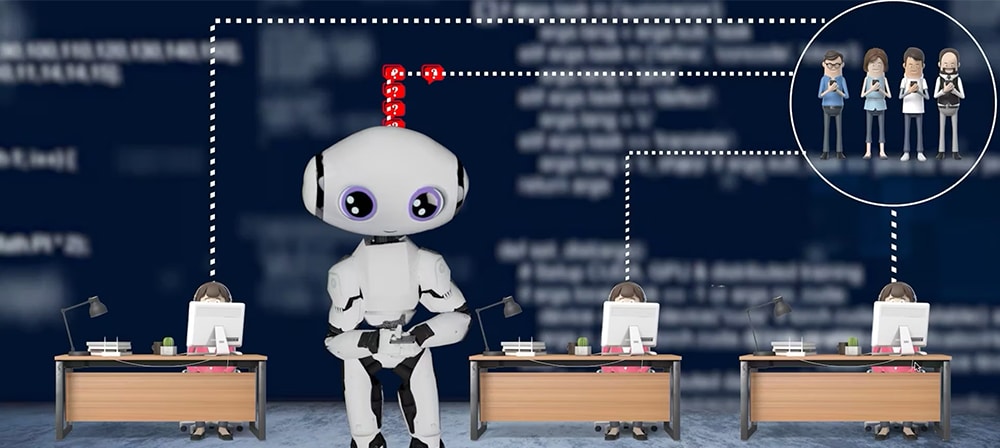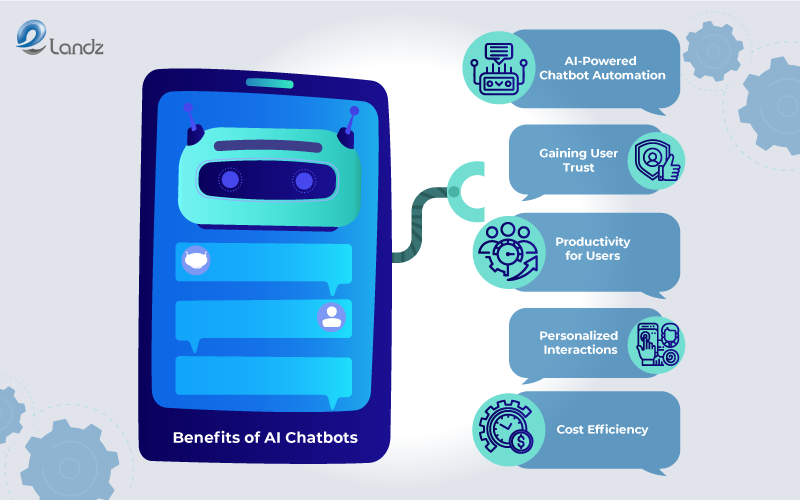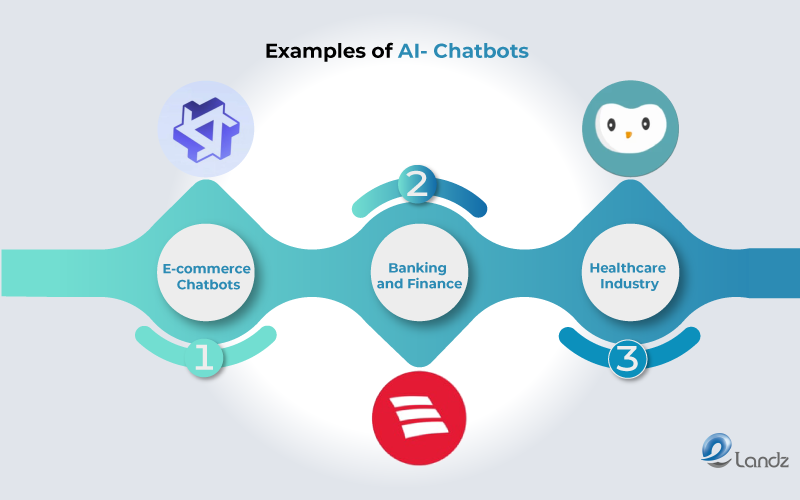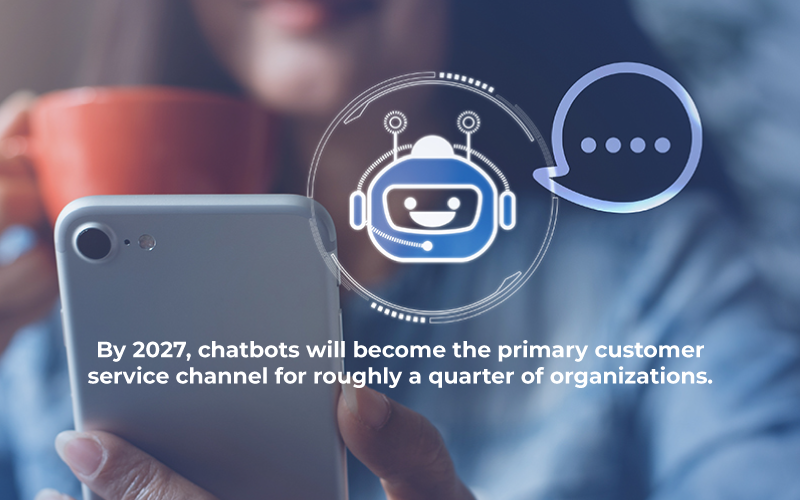
AI-Powered Chatbots: Enhancing Customer Support
22 Aug 2024Introduction
Aren’t AI-powered chatbots just fascinating? Valued at USD 7.01 billion in 2024, the chatbot market sector projection is USD 20.81 billion for 2029.
The more you read about the examples of AI chatbots, the more riveting it gets. Digital customer service system is so different from what it was in the past. From the shortest interaction to complicated queries, these artificial intelligence chatbots are rewriting customer service rules.
What are AI Chatbots?
Also known as intelligent virtual assistants, AI-powered chatbots mimic human behavior.
“Chatbot is a computerized program that acts like a colloquist between the human and the bot.”
The COVID pandemic was an accelerating agent for the global AI chatbot movement. Companies began to see the importance of providing hassle-free, 24/7 customer service.
How do AI Chatbots work?
These smartbots or virtual agents are advanced AI systems that are a typical example of human-computer interaction. AI-powered chatbots perform tasks that echo specific roles, moreover, they erase the stress of manual labor.
How do these chatterbots reflect an impeccable partnership between AI and automation?
Now, let’s break down AI chatbot technology.
Pattern matching is based on repetitive tasks.
The Artificial Intelligence markup language is for natural language processing for humans and chatbots
Chat script and Rivescript are scripting languages for the development of chatbots.
Latest Semantic Analysis is a natural language processing technique for processing textual data.
Natural Language Processing explores the analysis and synthesis of natural language (text or speech) using computers.
Natural Language Understanding is the application of artificial intelligence to understand human languages.
Benefits of AI Chatbots

There is something about AI-driven chatbots that has always piqued my interest.
Is it the ability to enhance customer support in milliseconds? Or, is it the power to make chore-like tasks seem like a piece of cake? Let’s dive right in.
AI-Powered Chatbot Automation
67% of consumers prefer chatbots for quick, seamless interactions. Statistics like this one prove that user faith in AI-driven chatbots is increasing.
The round-the-clock support and complete automation of customer services allow teams to focus on what truly matters – creative development and monitoring. As enterprises expand, human agents are stuck in a web of problems.
AI virtual agents can provide personal service to each user, with the same amount of care and attention. Constant availability also increases customer loyalty.
Gaining User Trust
Trust must exist between the brand and the purchasing party to attract frequent buyers. As we share our personal information, there is always the concern of privacy.
Chatbot conversational skills have a massive impact on user satisfaction. According to a report on AI interactive agents and customer service, the professional tone has a lot to do with how the customer perceives the exchange.
“..how professional the chatbot is in the specific field..”
The client can instantly detect any discrepancies or inadequacies in communication. Along with human-like nature exhibiting competency is crucial, and that definitely depends on AI chatbot training!
Productivity for Users
If you are a company investing in chatbot technologies, clearly you are on a path to magnifying your efficiencies. However, the crux of this section is enhancing customer experience.
AI-powered chatbots can generate timely responses through machine learning and algorithms. Where do they fetch the data from? Well, as soon as a question arrives, the chatbot searches the database for information that matches the input query.
The most daunting activities seem fairly simple. Thanks to AI and automation, these AI conversational bots can talk to multiple customers without the occurrence of human errors.
Cost Efficiency
I am sure you have come across several articles talking about the cost-effectiveness that AI-power chatbots bring to the table. However, you need to know the reasons behind this affordability.
Hiring and training personnel is expensive. Not only does it take up time, it carves a hole in the pocket. Chatbots can save up to 30% on customer support services. Moreover, overall operational costs also decrease.
Remember when you had to call the company several times and yet, no answer? That’s why AI-powered chatbots came into the equation. The design of these chatting robots is such that the purpose is to cater to users.
Examples of AI- Chatbots

62% of consumers prefer using chatbots over waiting to speak with human agents.
From simple rule-based systems to state-of-the-art language models, these chatbots are shaking up how businesses interact with their audience. Of course, these nifty talk bots are not a part of just one sector. Many industries are deploying AI chatbot features to elevate sales and marketing.
E-commerce Chatbots
Your customers want to know you. The purchasing party wants to understand the brand and its work ethic before buying. Here e-commerce AI chatbots are giving a new meaning to retail.
Driving Conversions
E-commerce chatbots increase customer engagement, by keeping them up-to-date with the latest developments. Moreover, these AI-powered chatbots provide personal support.
Customer Service Personalization
E-commerce chatbots soak up human interactions and integrate data with human-like text to gain more loyal clients.
Through customer queries, behavior, history, age, etc, artificial intelligence chatbots can deliver the best customer experience personalization.
Deal with Customer Concerns
From customer queries to reservations and online bookings, online virtual assistants can do it all. Moreover, these conversational bots can remember essential details such as contact information.
The more data you collect, the easier it becomes to retarget customers.
Ali Baba Chatbots
Let’s take the example of Ali Baba. Who doesn’t know about one of the largest e-commerce companies in the world? A huge enterprise means an even more extensive customer base.
Moreover, Ali Baba is a two-sided platform. This means there are business merchants and users in the loop. AI chatbots handle customer engagements for more than two million daily sessions. These virtual assistants handle a range of questions and resolve issues without human intervention.
Even more scintillating news is that Ali Baba launched a generative chabot Tongyi Qianwen. Its capabilities include AI content generation in English and Chinese and producing human-like responses to prompts.
Banking and Finance
Conversational AI banking agents are leading the way in financial services. The banking industry is currently undergoing a digital transition.
During this phase, banks are beginning to value the relevance of enhancing customer services.
Answer Customer Queries
These AI-backed chatbots can give financial guidance and advice. Banking AI chatbots can take over the most dreary tasks such as account updates, closing accounts, and transaction reminders.
By doing so, these reliable agents reduce overall operational costs.
Personal Banking Assistants
Almost eight in 10 (77%) banking leaders say personalization leads to increased customer retention. Bank AI chat technology orchestrates an experience that makes users feel at ease.
Moreover, these chatbots can track monetary transfers, follow up, and pick up on previous conversations.
Fraud Detection
Guarding someone’s hard-earned cash is tough. Often, bankers face the stress of maintaining security.
AI chatbots keep clients informed 24/7 and alert them if anything suspicious happens. Hence, these AI and ML-based chatbots prevent many mishaps.
Erica Bank of America
Bank of America was behind the release of AI-driven virtual assistant Erica. Clients engage with Erica two million times a day. Erica helps clients understand their spending patterns, explore strategies, monitor their subscriptions, etc.
However, the list of services does not end here. The bank’s AI advisor also caters to routine queries, finding transactions and bill payments. Apart from the technical handling, Erica has a humorous side too.
It has shared more than 30 jokes with clients 49,000 times to date. An AI chatbot bursting with a bubbly personality is the perfect partner. Moreover, the Erica chatbot receives frequent updates. As a result, you get cx-optimized performance and responses.
Healthcare Industry
The Global Healthcare Chatbots Market will reach 1,615.2 million USD by 2032 from a valuation of 307.2 million in 2022.
We might not realize it but AI intelligent assistants are an asset to the medical field. Generative AI chatbots have become even more popular since they elevate the patient experience. Now, let’s talk about chatbot use cases in healthcare.
Schedule Appointments
In emergencies and with an influx of patients, it can become difficult to schedule appointments on time. A medical AI chatbot can check on free slots and organize meetings.
Assist in Treatment Plans
Healthcare AI chatbots guide the patient so they take their medication on time. It is synonymous with having your medical assistant, that too, without the extra charges. When there are multiple dosages, AI chatbots act as reminders.
AI Mental Health Chatbots
It is one of the most prominent AI chatbot use cases. No matter how digitally connected we are, not everyone is comfortable discussing their mental health concerns.
With cultural barriers and taboos, the topic becomes even more sensitive.
These medical bots can safeguard privacy through strong encryption. These bots handle the standard tasks, therefore professionals have more time for one-on-one care.
Wysa AI Chabot
Wysa Chatbot is an example of a top AI chatbot for healthcare. You can even call it an AI coach. Using natural language processes and cognitive behavioral therapy concepts to establish a bond with patients.
Moreover, Wysa tracks progress, gives on-demand support, and refers to human specialists when needed. It makes the users feel they can express themselves without any judgment.
Users also have access to tools and exercises. The roles of this AI chatbot include discussing mental well-being, employee support, and even tools for students to cope with anxiety.
Future Trends

By 2027, chatbots will become the primary customer service channel for roughly a quarter of organizations.
The journey of chatbots from the Jabberwackey in 1988 to the top AI-powered chatbots is no less than impressive.
Just like the relationship between demand and supply, marketing experts are beginning to see the benefits of AI and automation.
Integration with Other Technologies
Internet of Things is a network of connected devices, which exchange data with each other. In other words, it is a network of physical devices. AI-powered chatbots will become embedded in smart devices.
Smart bots and voice technology will change how tech and consumers interact with the surrounding environment. On average, 80% of consumers use AI voice assistants for shopping.
Natural Language Processing Technology
These artificial conversation entities are becoming smarter as natural language processing algorithms become more advanced. NLPs enable chatbots to understand conversations and pick up nuances. Generative AI chatbots will become the next big thing.
A LinkedIn article on the future of artificial intelligence chatbots highlights that these bots will take on the roles of coaches, mentors, and other professionals.
With NLP and deep learning, chatbots can scrutinize questions and become more accurate. They will understand not only your words but also the emotions behind them. The focus will shift to data-driven personalization and emotional intelligence.
AI Chatbot Limitations
No doubt, AI chatbots offer reliability and proficiency. An AI chatbot like chat GPT might be a powerful tool, but it’s not infallible. Think of it as a smart friend who sometimes gets confused. That’s why, it’s crucial to stay alert.
Data Privacy and Security
If you type in “ how to prevent healthcare data breaches”, the number of results will be limitless. Data leaks are happening more frequently
The protection of customer data is necessary. There can be the risk of hacking and failure to comply with AI chatbot regulations.
Companies should prioritize the implementation of data management best practices. Sharing private information with chatbots can be a risky gamble. It’s like giving your keys to a stranger.
Maintaining Human Touch
“Rigid chatbots struggle with open-ended conversations and grasping context and intent. They may fail to pick up on non-verbal cues like sarcasm or frustration that humans would notice.”
AI-powered chatbots act according to the datasets they learn from. Therefore, you must study the data with caution and critical thinking. The concept of an emotional AI chatbot still has a long way to go. An option is to give human access after receiving several failed attempts.
Sometimes, answers might not be up to the mark. Consider this example, you hire a chef for a high-end restaurant. Now, you have to make sure food quality remains above average. Exceptional would be a better word. The ingredients, equipment, and cooking skills – all these factors result in the preparation of gourmet meals.
Fine-tuning data and monitoring its quality is a prerequisite.
Conclusion
“I think chatbots are the future of engagement between a fan and a brand or celebrity.”
Christina Milan (Forbes)
Are you ready for the AI chatbot takeover? These intelligent systems ensure that human agents can dedicate their efforts to resolving more complex customer issues. The AI conversation engines are always on call, ready to rescue customers from long wait times and bring smiles with their charm.
The potential for chatbots to deliver even more tailored and human-like interactions is vast. By embracing AI, you’re not just enhancing customer support; you’re gaining a strategic advantage. It’s time to level up.
FAQS
What is AI-powered customer support?
AI-driven chatbots can handle routine inquiries, provide on-the-spot answers, and even offer personalized recommendations.
Therefore, human agents can work on cracking down on more demanding problems.
It’s like having a 24/7 super-smart, always-available team at your fingertips. The programming of the AI system is such that it can imitate a human conversation.
How does AI benefit customer experience?
AI-powered chats, smartbots, or artificial intelligence conversationalists are the idea assistants for enhancing customer support.
Due to quick replies and systematized performance, these chatbots are proving to be a treasure for different industries. Over time, chatbots learn and get better, offering refined interactions.
What is enhanced customer service in AI?
AI chatbots can deliver personalized interactions to increase customer engagement.
It’s like having a customer service rep who’s always learning and polishing themselves. By analyzing data, AI can predict your needs and deliver solutions before you know you need them. It’s like having a customer service genie in your pocket.
What is enhanced customer service in AI?
AI-backed chatbots can deliver personalized interactions to increase customer engagement.
It’s like having a customer service rep who’s always learning and polishing themselves.
By analyzing data, AI can predict your needs and deliver solutions before you know you need them. It’s like having a customer service genie in your pocket.
Do chatbots increase customer satisfaction?
AI chatbots are key players in modernizing customer service.
The presence of artificial intelligence conversational agents leads to higher customer satisfaction and better business performance. The reason behind this is that they balance technology with a personal touch.


